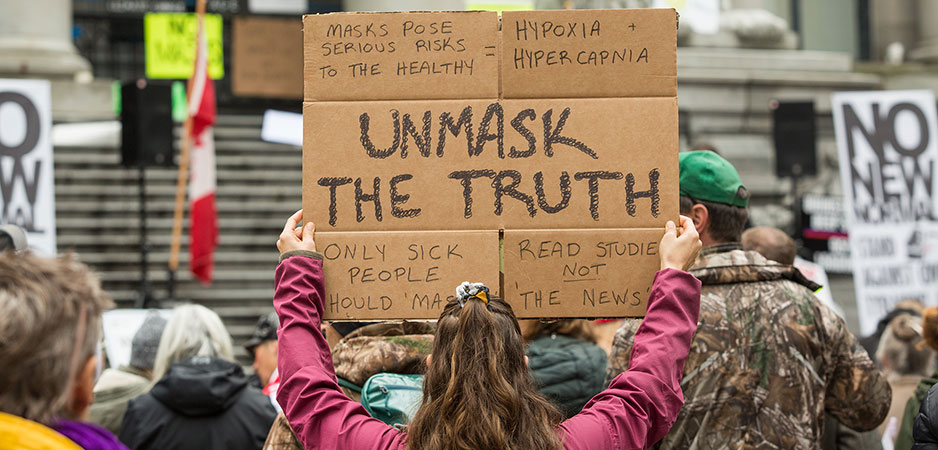Toronto’s Gerrard Street is known for its lively small neighborhood businesses. The east end of the street in particular is famous for being home to one of the largest South Asian marketplaces in North America. It is there that I recently saw a series of posters advertising the new “Borat Subsequent Moviefilm,” directed by Jason Woliner. The posters, however, advertised more than the controversial movie: Someone had covered Borat’s eyes with white paint and written “COVID is Fake” and “The Mask is a Muzzle” over his body.
Europe’s Far Right Fails to Capitalize on COVID-19
“Don’t Wear a Mask” was the main message, and although we don’t know the authorship of this graffiti, it belongs to Canada’s anti-mask rhetoric in the context of COVID-19. Conspiracy theories and claims to freedom of choice have characterized the radical-right fight against mandatory mask policies in Canada, bringing new light to its opportunistic and illiberal nature.
March to Unmask
The Canadian response to the COVID-19 pandemic has been largely described as standing in sharp contrast to the United States. However, early this summer, nearly three in five Canadians reported that they were “regularly wearing face masks when out in public,” which constitutes one of the “lower rates of face-mask usage of countries surveyed.” Similarly, by mid-summer, polls suggested that Canadians were “less eager to wear face masks than their American neighbours.”
In addition, while in the first months of the pandemic Canadians’ trust in government, doctors and scientists increased across the political spectrum, that cross-partisan consensus soon splintered, and the gap between Canadians who self-identify as left-leaning and those who self-identify as right-wing continuous to grow. As data suggests, while at the outset of the pandemic mask usage was below 10% for both left and right-leaning groups, over time, the discrepancy between the left (in the 90% range) and right (60% range) grew substantially.
One of the main reasons why this is happening appears to be the increasing appeal to conspiracy theories by those on the right side of the political spectrum. This is due to the increase in mistrust in mainstream media and skepticism toward liberal democracy, which has allowed for a growing tendency to rely on alternative sources of (mis)information. This trend has been reflected in anti-lockdown rallies across Canada, the latest of them taking place in October in Vancouver, where thousands of people mobilized against provincial restrictions designed to prevent the spread of COVID-19, including mandatory mask policies. Many carried signs promoting QAnon conspiracies, which have fueled the viral anti-mask phenomenon, embraced as an example of “people taking the fight against their shadowy enemy.”
Up until now, rallies decrying mandatory mask policies have been held in at least six Canadian provinces as part of the March to Unmask movement, which argues that wearing a mask should be voluntary and demands “the right to choose.” A national parallel movement, Hugs Over Masks, has also mobilized thousands who are “fighting for humanity” and for “their freedom” against COVID-19 restrictions. The co-founder of Hugs Over Masks, Vladislav Sobolev, compared “what is happening in Canada [with] the uprising of Nazi Germany, as well as the Bolshevik Revolution in Russia,” arguing that wearing masks is in fact dangerous for people’s health and a violation of their freedom.
Sobolev stated that theirs is a “spiritual war,” a claim that was again heard over a month ago in Montreal, Quebec, where fringe radical-right politicians organized what was one of the biggest protests against the Quebec government’s COVID-19 measures to date. At the demonstration, some held signs about the 5G internet network, whereas many carried placards displaying QAnon’s emblem or waved pro-Trump flags. Only a week later, another demonstration against “mandatory mask wearing and … the government state of emergency” took place outside a Montreal subway station, where protesters chanted “Liberty!” as they waved Quebec flags. A leading figure in the protest, Alexandre Laberge-Ayotte, stated that he was not “anti-mask, but rather ‘pro-choice.’”
Whose Choice?
Roxane Martel-Perron, a specialist in right-wing extremist groups at Montreal’s Center for the Prevention of Radicalization Leading to Violence, explains that while “The far-right movement had kind of died down last year,” the COVID-19 pandemic has allowed some extremist figures to use the anti-mask issue to get a foot back onto the public sphere and find new audiences. Radical-right groups in Quebec gradually waned over 2019, but this was only after they had won the battle for the provincial Bill 21, or the Act Respecting the Laicity of the State. The new law was supported by four principles: the religious neutrality of the state, the separation of religion and the state, the equality of all citizens, and freedom of conscience and religion.
While under debate by Quebec’s National Assembly, Quebec’s radical-right groups rallied in support of the provincial government’s law against religious symbols, pointing at the importance of laïcité (secularism). However, Bill 21 ultimately denied Muslim women the choice of dressing according to their religious beliefs while holding positions of authority. As a consequence, the act was described as “unconstitutional” and affecting primarily “immigrant and racialized communities” working in the public sector.
Meanwhile, Quebec’s premier, François Legault, insisted that the bill was “consistent with the views of most Quebecers that the state ought to be religiously neutral.” Similarly, Quebec nationalists agreed on seeing Bill 21 as “a symbolic affirmation of their nation’s right to chart its own social course.” The law was passed in June 2019.
The arguments used by radical-right and nationalist groups throughout 2019 in favor of approving Bill 21 constituted fundamental threats to liberal tenets such as religious freedom, but also freedom of choice and expression, which is precisely what the radical right demands with its current anti-mask rhetoric in Quebec. While the radical right invoked freedom in support of Bill 21 in 2019 and against COVID-19 restrictions in 2020, in neither of those cases was the word “liberty” used to protect Canada’s cherished democracy and its policy of multiculturalism for the promotion of cultural heritage. It was used to challenge the people’s trust toward the very institutions in charge of protecting them.
The blatant contradictions around radical-right uses of the notions of liberty and freedom in Canada bring light to its notions of privilege, which stem from narrow understandings of citizenship, nationhood and belonging. It demonstrates that freedom of choice is perceived as being exclusionary or limited to the nation, namely the ethnic majority. This reflects a sense of ethnic supremacy, in this case, white supremacy in particular. Finally, it illuminates the capacity for radical-right movements to weaponize the COVID-19 pandemic in order to spread hate by exploiting liberal tenets to the detriment of democracy.
*[Fair Observer is a media partner of the Centre for Analysis of the Radical Right.]
The views expressed in this article are the author’s own and do not necessarily reflect Fair Observer’s editorial policy.
Support Fair Observer
We rely on your support for our independence, diversity and quality.
For more than 10 years, Fair Observer has been free, fair and independent. No billionaire owns us, no advertisers control us. We are a reader-supported nonprofit. Unlike many other publications, we keep our content free for readers regardless of where they live or whether they can afford to pay. We have no paywalls and no ads.
In the post-truth era of fake news, echo chambers and filter bubbles, we publish a plurality of perspectives from around the world. Anyone can publish with us, but everyone goes through a rigorous editorial process. So, you get fact-checked, well-reasoned content instead of noise.
We publish 2,500+ voices from 90+ countries. We also conduct education and training programs
on subjects ranging from digital media and journalism to writing and critical thinking. This
doesn’t come cheap. Servers, editors, trainers and web developers cost
money.
Please consider supporting us on a regular basis as a recurring donor or a
sustaining member.
Will you support FO’s journalism?
We rely on your support for our independence, diversity and quality.






